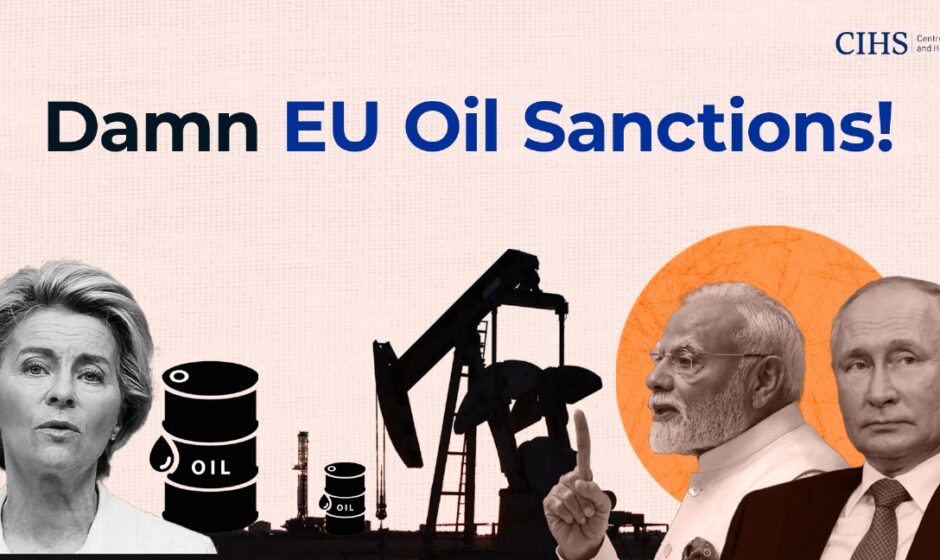Strategic autonomy coupled with its right to source crude at affordable prices and quality is non-negotiable. Here’s New India…
By NC Bipindra
Latest round of sanctions announced by European Union on July 18, 2025, has opened a new chapter in the growing geopolitical standoff between Brussels and New Delhi.

For the first time, EU has directly targeted Indian oil trade, specifically naming Nayara Energy’s Vadinar refinery which is majority-owned by Russia’s Rosneft.
The EU sanctions, coming as it does within days of NATO Secretary General Mark Rutte’s warning about secondary sanctions on India, are part of these regional institutions’ crackdown on what it calls indirect financing of Kremlin’s war in Ukraine.
At the heart of this issue lies India’s continued and unapologetic purchase of discounted Russian crude. India has been refining this oil and exporting resultant diesel and jet fuel, some of which flows back into Europe.
While New Delhi views this as a perfectly legal and economically sound strategy, Brussels sees it as a dangerous workaround that weakens Western sanctions regime.
What makes this clash more than a bureaucratic quarrel is its broader significance for global energy markets, economic diplomacy and tests limits of Western pressure in a multipolar world.
Why Is the EU Escalating Pressure on India over Russian Oil Purchases?
EU wants to isolate Russia economically. India, however, is determined not to compromise its energy security and strategic autonomy, the principles it considers non-negotiable.
From European perspective, India’s growing role as a refinery hub for Russian crude threatens to undercut its sanctions framework.
Eighteenth package of EU sanctions which includes lowering price cap on Russian crude to about $ 47.60 per barrel and sanctioning over 100 tankers in Russia’s so-called “shadow fleet,” is aimed at choking off alternative routes for Russian oil revenue.
By focusing on Indian exports and targeting refineries like Vadinar, Europe is sending a clear message that it will go after any actor — state or private — that contributes to propping up Moscow’s war chest.
What are Its Strategic Imperatives?
But India isn’t taking this lightly. Ministry of External Affairs responded swiftly and sternly, calling the EU’s actions unilateral and unjust.
Officials in New Delhi accused the bloc of practicing double standards, pointing to Europe’s own imports of Russian LNG and uranium even after war in Ukraine escalated.
Energy security, Indian leaders assert, is not just a matter of policy but a constitutional duty, especially for a developing nation with over 1.4 billion people striving for economic growth and social stability.
From New Delhi’s standpoint, its trade with Russia is both lawful and pragmatic. Indian officials frequently cite EU Regulation 833 / 2014, which states that once a good is substantially transformed in a third country, it is no longer considered to originate from the sanctioned country.
India’s External Affairs Minister Dr. S. Jaishankar and Petroleum Minister Hardeep Singh Puri have made this argument repeatedly, maintaining that diesel refined in India is legally distinct from the Russian crude it was made from.
The economic logic behind this policy is also compelling. Minister Puri has stated that importing discounted oil from Russia has saved India billions of dollars, helped stabilise inflation and shielded consumers from worst of global energy shock.
In a world still reeling from economic aftershocks of the pandemic and the war, these savings have helped India remain on a steady growth trajectory while other economies faltered.
India’s position is also shaped by deeper strategic calculations. The country has long prided itself on its foreign policy of non-alignment, now recast as “strategic autonomy.”
This allows New Delhi to navigate complex relationships with both the West and traditional partners like Russia without being forced to pick sides.
India’s close defence and energy ties with Moscow continue, even as it deepens cooperation with the United States and European Union in other areas like technology, trade, and counterterrorism.
What are India’s Strategic Options?
Rather than cave in to external pressure, India has quietly but effectively diversified its oil imports. Over past year, it has increased purchases from Middle Eastern countries, United States, Brazil and new suppliers in Africa and Latin America.
This diversification has enabled India to demonstrate that it is not wholly dependent on Russian oil, even as it defends its right to continue buying it.
At the same time, India has expanded its investment in natural gas, renewables and long-term energy security. A 15-year LNG deal with United Arab Emirates’ ADNOC, for example, will bring in one million tonnes of gas annually, supporting the country’s gradual shift toward cleaner fuels.
India’s resilience is also built on its ability to conduct trade outside of Western financial and logistical systems. Russia has set up rupee-based trade settlements, used vostro accounts through Indian banks and relied on non-Western insurance and shipping firms. This alternative infrastructure insulates India-Russia energy trade from Western sanctions to a large extent and helps maintain stability despite external disruptions.
Even as EU tightens restrictions and hints at possible secondary sanctions, India continues to find new export markets for its refined petroleum products. Africa, Southeast Asia and Latin America have emerged as key destinations where buyers are less concerned about the origins of crude and more focused on price and availability.
These regions offer India a buffer against any loss of European markets, keeping its refineries running and export revenues intact.
At the legal level, India has pushed back forcefully the very idea of violating sanctions. Indian legal experts argue that under international law, unilateral sanctions not backed by United Nations are not binding.
New Delhi has taken this position consistently and has also pointed out hypocrisy of Europe’s own uneven implementation of sanctions where Russian LNG and enriched uranium remain untouched by embargoes.
Behind all this lies a larger philosophical question. Should developing countries bear the brunt of economic disruptions caused by conflicts they did not start and do not control?
India has answered this with a firm no. It argues that energy access at affordable prices is a matter of global justice and that countries with growing populations and fragile economies should not be penalised for pursuing responsible, lawful and economically sound energy strategies.
Way Forward for India?
In many ways, clash between India and EU over Russian oil is a microcosm of a shifting world order. Gone are the days when Western sanctions could dictate global trade patterns.
As India’s response shows, major emerging economies are increasingly assertive about their rights and capable of building alternatives to Western-centric systems.
The road ahead may be bumpy and tensions could rise further if Brussels continues to escalate enforcement. But India has prepared well.
Its policy is based not just on pragmatism but on principles: energy security, legal clarity and the strategic imperatives of autonomy.
This isn’t just about oil. It’s about how nations define sovereignty in the 21st century, balance their economic needs with diplomatic pressures, and shape a multipolar world that no longer revolves around any single power bloc.
India’s stand, in the end, reflects not just a response to sanctions but broader assertion of independence in global affairs. It is not just refining Russian oil. It is refining its place in the world.
(Author is Chairman, Law and Society Alliance, a New Delhi-based think tank and guest columnist with CIHS)



